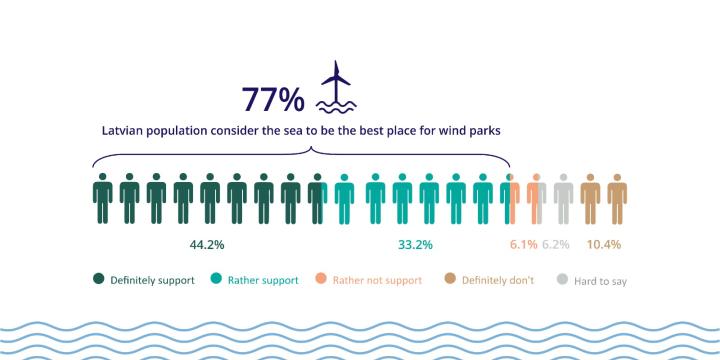Survey: 77% of the Latvian population consider the sea to be the best place for wind parks
Survey: 77% of the Latvian population consider the sea to be the best place for wind parks
According to a survey conducted by the market and public opinion research centre SKDS, 86% of respondents believe that Latvia should be energy independent from other countries, while only 10% think it is not important at all or rather not important. The survey was commissioned by the Investment and Development Agency of Latvia (LIAA).
The survey data shows that 71% of respondents strongly or rather support wind energy extraction in Latvia and the establishment of wind parks in Latvia, while 23% do not support it. Given the fact that Kurzeme has the highest wind energy potential, the survey specifically asked about the development of wind parks in this region. The general population of Latvia (65%) strongly or rather supports the idea of building a wind park on the Kurzeme coast, according to the results of the survey "Awareness and opinion of the population about wind parks and the idea to build a wind park in the Kurzeme region" conducted by the research centre SKDS in January 2024.
"The support of the inhabitants is essential for the development of any project, so we are pleased that the public is aware of the role of energy in the context of the country’s economic development and security. The results of the survey show that the majority of the Latvian population supports the development of wind parks in Latvia and Kurzeme. Projects such as the Latvian-Estonian offshore wind park ELWIND have already attracted additional attention from investors, and the beginnings of green hydrogen production are noticeable on the Kurzeme shore, which will potentially generate a significant economic contribution," says Iveta Strupkāja, Acting Director General of LIAA.
The survey also asked respondents to indicate the main benefits for Latvia and its citizens if the Kurzeme Wind Park were to be built. The most frequent answer was that it would ensure greater energy security for Latvia (63%). It is significant that people who consider Latvia’s energy independence to be more important are relatively more likely to support the establishment of wind parks in Latvia. Lower electricity prices and new jobs are also relatively common benefits. The benefits less likely to be mentioned by inhabitants are that it will allow the development of new industries, such as hydrogen production (21%).
77% of Latvian respondents consider the sea to be the most suitable location for new wind parks. The survey shows that 35% of respondents have seen an offshore wind park in person, while 60% have not.
At the end of the survey, respondents were also asked to indicate what they thought the impact of the Kurzeme coast wind park would be on the Latvian economy if it were to be built. Overall, 60% think it would be definitely or rather positive, while 11% think it would be definitely or rather negative; 15% think it would have no impact on the economy of Latvia.
The ELWIND offshore wind park will be a major project for the Baltic Sea region with a high economic and social impact. The construction of wind parks in Latvia and Estonia will generate at least 1 000 megawatts of electricity and create at least 2 800 new jobs in Latvia. In Latvia, the offshore wind park is to be built on the Kurzeme coast between Liepaja and Ventspils, where the nearest possible boundary is about 15–22 km from the coastline.

